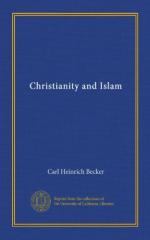The preponderance of Muhammedan influence was increased by the fact that Islam became the point of amalgamation for ancient Eastern cultures, in particular for those of Greece and Persia: in previous centuries preparation had been made for this process by the steady transformation of Hellenism to Orientalism. Persia, however, had been the main source of Eastern civilisation, at any rate since the Sassanid period: the debt of Byzantine culture to Persia is well known. Unfortunately no thorough investigation has been made of these various and important changes, but it is clear that Persian civilisation sent its influence far westward, at first directly and later through the medium of Muhammedanism. The same facts hold good with regard to the diffusion of intellectual culture from Persia. How far Persian ideas may have influenced the development of Muhammedan and even of Christian eschatology, we need not here discuss: but the influence of the great Graeco-Christian schools of Persia was enormous: they made the Arabs acquainted with the most important works in Greek and Persian literature. To this fact was due the wide influence of Islam upon Christian civilisation, which is evidenced even to-day by the numerous words of Arab origin to be found in modern European languages; it is in fact an influence the strength of which can hardly be exaggerated. Not only the commercial products of the East, but important economic methods, the ideals of our so-called European chivalry and of its love poetry, the foundations of our natural sciences, even theological and philosophical ideas of high value were then sent to us from the East. The consequences of the crusades are the best proof of the enormous superiority of the Muhammedan world, a fact which is daily becoming more obvious. Here we are concerned only with the influence exerted by Muhammedan philosophy. It would be more correct to speak of post-classical than of Muhammedan philosophy. But as above, the influence of Christianity upon Islam was considered, so now the reverse process must be outlined. In either case it was the heir to the late classical age, to the mixed Graeco-Oriental culture, which influenced Islam at first in Christian guise. Islam is often able to supplement its borrowings from Christianity at the original sources, and when they have thus been deepened and purified, these adaptations are returned to Christianity in Muhammedan form.




